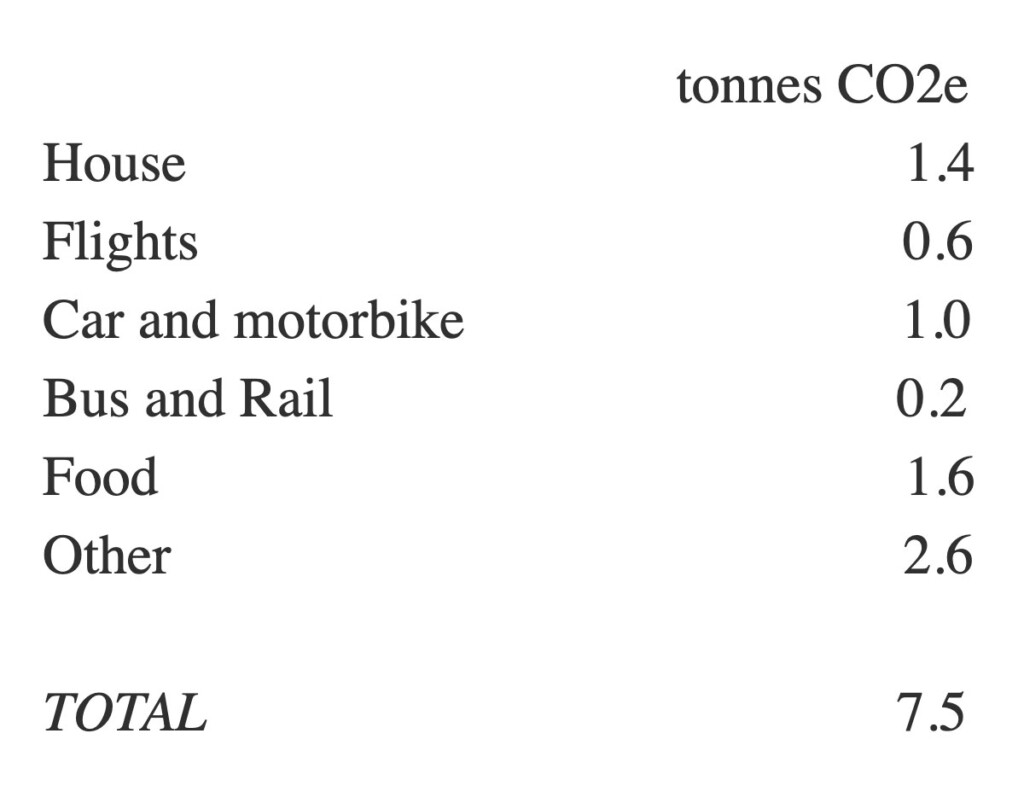
Carbon Footprint – Calculate
Calculate your personal carbon footprint
There are several free online calculators which will estimate your personal carbon footprint. The one we recommend is relatively quick and easy to use but has sufficient detail and accuracy to be really useful. Go to www.carbonfootprint.com
- First create yourself an account (under MY ACCOUNT, top right). This allows you to go back and modify your footprint data anytime.
- Then click on CALCULATE/FREE CALCULATORS/INDIVIDUAL.
- Now you are ready to enter your data on the tabs shown and get your carbon footprint. Finding your data might take some time, but after that, it’s quite quick. Don’t worry if you don’t know the answer to a particular question, just make your best guess.
For help on each section, go to www.carbonfootprint.com/calculatorfaqs.html
WELCOME
Enter your country (United Kingdom). You don’t need to change the period: it will use 2020 by default.
HOUSE
First, enter the number of people in your household. The Greenhouse Gas Emissions (GGE) from this tab will be divided by this number to give your personal contribution. Each of the other tabs should be just your personal values. Alternatively, you can enter ‘1’ here and enter the household’s total values on all the tabs.
Enter the amount of fuels that you used last year. The app gives you a choice of units; for example, the KWh actually used, or (in the case of gas) the £ spent. Look at your previous energy bills to find these figures or look online if that’s how you manage your account with your supplier.
FLIGHTS
If you flew last year, enter each of the flights that you took in 2020. You may have taken less in 2020 than you normally do, so you could enter the data for 2019 or a typical year if you want a more realistic picture of your usual footprint.
CAR OR MOTORBIKE
If you have a vehicle, enter your rough annual mileage. MoT statements might give you an idea. Then you can either enter the make and model of your car or fill in the last question on the emissions in g/km. If it’s a modern car then you can find that number on the Car Registration Certificate in section 4, item V.7. BUS & RAIL Enter your best guess of annual mileage by type of public transport.
SECONDARY
This is the hardest section to complete but is important as it concerns what we buy, which often contains a lot of ‘embedded’ carbon. For example, the quantity of greenhouse gases emitted in making the clothes that you buy.
The first item on food is particularly important as what is eaten and drunk is typically a quarter of a person’s carbon footprint. First enter what sort of eater you are, for example, medium meat eater/vegan etc. The quantities for meat-eaters are: High = more than an average of 100g meat per day, medium = 50-100g, low = less than 50g.
Don’t forget to change the currency to £ GBP.
In the UK much of the cost of pharmaceuticals is met by the NHS and Education is often free for children. Just enter what you can and acknowledge that the carbon footprint for those items is mainly outside your personal footprint. Some calculators add on a share for the whole of state expenditure, perhaps 1.7 tonnes per annum.
You might be floundering on some of these questions. You could look at your bank statements or elsewhere, but in the end, just make your best guess.
RESULTS
Now you can see what your carbon footprint is compared to the average for the UK of 5.5 tonnes per person. For Cholsey, the average is estimated to be 7.5 tonnes. We want to halve this by 2030. The world needs to get down to 2 tonnes per person eventually to stop runaway climate change.
If you calculated your footprint for the whole household, then multiply the above comparisons by the number of people in your household.
If you want to compare with what the Impact Tool estimates for the average person in Cholsey currently, that is:
You might be surprised or even shocked by what you found.
Many of you will want to take the next step and think about how you could reduce your footprint. You’ll find some ideas by following the link at the bottom of the RESULTS page. You can also use carbonfootprint.com as a ‘what if’ tool. On each tab it gives the GGE for each line, so you can see how it varies.
In any case, please get back to us via the ‘Contact us’ tab. Tell us how you found the experience and what you have identified as problem areas. We may be able to help.

